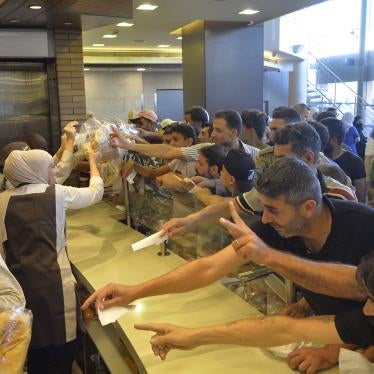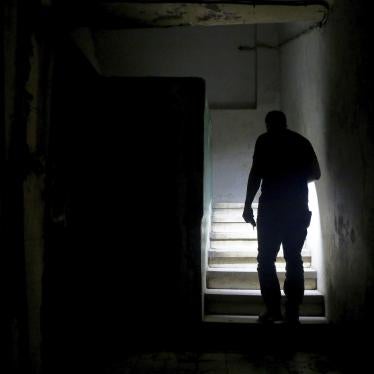New World Bank data in Lebanon reveal alarming figures of over 70 percent of the population experiencing multidimensional poverty. This highlights the failures of World Bank and EU-backed means-tested social security - which covers only about one-fifth of the population - to adequately address this situation. While the government has initiated some steps towards universal social security since 2023, more structural reforms have become urgent.
Published in May 2024, the World Bank report, “Lebanon Poverty and Equity Assessment 2024 – Weathering a Protracted Crisis”, estimates that 73 percent of Lebanese and nearly all non-Lebanese residents, primarily Syrians, live in multidimensional poverty, that includes elements affecting human rights such as access to electricity, healthcare, and education. The share of people living in monetary poverty – defined by the World Bank in January 2023 as those consuming less than LBP 53.4 million per person per year, equivalent to about USD 3 per day1– has tripled over the past decade and now affects 44 percent of the population. This situation is particularly acute in north Lebanon and among Syrian refugees, where 9 in 10 individuals live in monetary poverty.
Despite such widespread and growing poverty, Lebanon’s approach to non-contributory social security is heavily means-tested, targeting coverage at only the poorest 20 percent of the population and leaving the majority behind. This approach started with the National Poverty Targeting Programme (NPTP) and was supplemented by the temporary Emergency Crisis and Covid-19 Response Social Safety Net Project (ESSN). Funded by the World Bank and donor governments, these programs identify beneficiaries through a so-called “proxy-means test” assessing over 40 indicators, including income, assets, housing quality, occupation, and demographic characteristics.
Proxy-means testing has been widely criticized by social policy experts, the United Nations, and human rights organizations for high rates of error, discriminatory policies, and stereotypes about poverty. Although there are ongoing discussions about reforming these programs, the proposed changes continue the same failed approach of proxy-means testing. Furthermore, as these programs are primarily funded through loans from the World Bank rather than progressive domestic revenue, they are unsustainable and contribute to Lebanon’s staggering debt.
Since 2023, the government has taken some steps towards establishing a more rights-aligned social security system. This was particularly critical to accompany a phase out of subsidies for food products, fuel, and medicines. In April 2023, Lebanon’s Ministry of Social Affairs, with technical and financial support of UNICEF and the International Labour Organization (ILO), launched the National Disability Allowance (NDA) program, providing a monthly benefit of USD 40 to individuals with disabilities between the ages of 18 and 28.2 In December of the same year, the Parliament adopted Law 319, introducing a new contributory pension scheme within the National Social Security Fund (NSSF). In February 2024, the government released its first National Social Protection Strategy (NSPS), committing to an ambitious vision to transform the existing failing social security system into a more universal one.
However, while the government has taken some steps indicating openness towards universality, the World Bank continues to advocate for proxy-means testing. In the report released alongside the data, it acknowledges the need to “strengthen the social safety net” and “ensure that all households in need have access to essential resources including adequate food, healthcare, and education”, but it suggests achieving this through “better targeting of the poor.”
The fixation with means-testing, a common practice of the World Bank that the Global Coalition for Social Protection Floors and over a hundred civil society organizations have been denouncing for years, is fundamentally flawed. It makes particularly little sense in countries like Lebanon where most people live in poverty, as highlighted in the World Bank’s own data. Identifying and reaching those most at risk can be an impossible task, turning the distribution of benefits into an error-riddled, lottery-like selection process that erodes trust in a system perceived as arbitrary. The promotion of an expensive and complex system to determine who is poor, when over 70 percent of the population falls into this category, is highly impractical and reflects a dogmatic rather than evidence-based approach that prioritizes the realization of rights. These systems not only fail to achieve their intended impact but also exacerbate tensions and undermine trust in already polarized societies, rather than fostering solidarity, social cohesion, and a social contract.
Moreover, the World Bank disregards the fact that social security is a human right under international law, to which everyone is entitled, irrespective of their income or assets. Recognizing that people’s economic, social and cultural rights are most at risk during common life events such as during childhood, old age, unemployment, or sickness, a person’s eligibility for a social security program should be based on whether they are a member of one of these groups, not their income or wealth.
The government of Lebanon, for its part, has failed to take adequate steps to reform, expand, and fund its existing social security system. Since 2019, people in Lebanon have been living through a financial and economic crisis considered to be one of the most severe globally since the mid-19th century. The crisis entrenched Lebanon’s long-standing inequality. Yet, five years into the crisis, the government has woefully failed to uphold its human rights obligations, failed to harness multiple options available to it to raise funds, including tackling tax evasion and addressing aggressive tax avoidance and adopting progressive tax reform, and has yet to pass a budget with a vision for ensuring even the bare minimum of people’s right to social security is fulfilled.
We call on the World Bank, IMF, and international donors, including OECD countries, to stop promoting and funding narrowly means-tested programs. Instead, they should support the government in expanding universal programs like the disability entitlement and implementing other universal schemes such as a social pension and a universal child benefit. The government should continue its progress towards universality, translate commitments into action, increase investments in social security through progressive domestic revenue generation, and promptly establish a mechanism to address complaints related to social security. Without these reforms, Lebanon’s poverty and human rights crisis will only worsen.
Signatories:
- AbibiNsroma Foundation ANF
- Act Church of Sweden
- Action Contre les Violations des Droits des Personnes Vulnérables
- Actions des femmes marginalisées pour le développement (AFMD ASBL)
- Ageing Nepal
- Amel Association International
- American University of Beirut: University for Seniors
- Amnesty International
- Arab NGO Network for Development (ANND)
- Arab Reform Initiative (ARI)
- Arab Renaissance for Democracy and Development (ARDD)
- Center for Studies on Ageing
- Centre for Social Sciences Research and Action (CeSSRA)
- Development Pathways
- Free Trade Union Development Center
- Friends of the Disabled Association
- Global Coalition for Social Protection Floors (GCSPF)
- Global Initiative for Economic, Social and Cultural Rights (GI-ESCR)
- HelpAge International
- Human Rights Watch
- Institute for Development, Research, Advocacy, and Applied Care (IDRAAC)
- JusticeMakers Bangladesh in France (JMBF)
- Lutte nationale contre la Pauvreté
- LWF Waking the Giant Initiative
- Make Mothers Matter (MMM)
- MENAFem Movement for Economic, Development, and Ecological Justice
- Social Policy Initiative (SPI)
- Social Protection Civil Society Network (SPCSN)
- The Bretton Woods Project
- The Policy Initiative
- The Solidarity Directory "Daleel Tadamon"
- The Tahrir Institute for Middle East Policy (TIMEP)
- We Social Movements (WSM)






